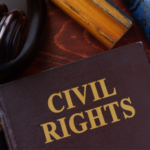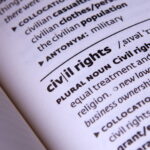Author Archives: Jay Butchko

How the First Step Act Can Help People Serving Life Sentences for Drug Crimes
In 2018, Congress enacted the First Step Act, a series of reforms to the federal criminal justice system. One such reform was to change the mandatory minimum sentences for individuals previously convicted of certain drug offenses. In some cases, this means a person who received a mandatory life sentence can now ask for re-sentencing… Read More »

Supreme Court Allows Police Shooting Victim to Proceed with Civil Rights Lawsuit
The Fourth Amendment protects you against “unreasonable searches and seizures” by the police. This means that if the police use excessive force in the process of detaining or restraining you, that can provide the basis for a federal civil rights lawsuit against the offending officers. But the mere “application of force” by itself does… Read More »

When Can Prosecutors Use “Pattern Evidence” to Prove You Committed a Crime?
If you are on trial for allegedly committing a crime, the prosecution generally cannot introduce evidence regarding any other crimes you may have committed in the past. This is considered “character evidence” and unless it has some relevance to the alleged crime, it is inadmissible. Essentially, the prosecution cannot use “prior bad acts” to… Read More »

When Can You Raise an Entrapment Defense to a Criminal Charge?
The police often use undercover officers to catch criminals “in the act.” Consider a scenario where a suspect is accused of selling illegal drugs to someone who turns out to be an undercover officer. Can the suspect then argue they were a victim of police “entrapment”? Entrapment is a legal term that applies when… Read More »

Can You File a Civil Rights Lawsuit if All You Ask for is $1.00 in Damages?
When the government violates your civil rights, you have the right to file a lawsuit. But before a court can hear your case you first must establish legal standing. This means you need to show that you suffered an actual injury–not merely a hypothetical one–as the result of the government’s misconduct. You also need… Read More »

Can You Appeal a Criminal Conviction Even if You Pleaded Guilty?
If you are convicted of a crime following a trial, you have the right to appeal. An appeal is basically a request to have a higher court review what took place at the trial and decide if there were any legal errors made that violated your rights. An appeal is not the same thing… Read More »

When Is Evidence of Other Possible Crimes Admissible in a Florida Criminal Trial?
A criminal trial is about a specific act allegedly committed by the defendant. It is not supposed to be a forum to put the defendant’s personal character on trial. For that reason, Florida law generally prohibits prosecutors from introducing “character evidence,” such as information regarding other crimes the defendant may have committed in the… Read More »

What Is Considered a “Speedy Trial” in Florida?
The Constitution guarantees all criminal defendants the right to a “speedy trial.” But what does “speedy” actually mean? That largely depends on where you are tried for a given crime. For example, when a defendant is tried in federal court, Congress has said a trial must begin within 70 days of the defendant’s indictment… Read More »

How Florida Law Continues to Punish Sex Offenders After They Complete Their Criminal Sentences
Sex crimes are treated differently than other types of offenses. For instance, you probably know that many people convicted of such crimes are legally required to register as “sex offenders” even after completing their prison sentences. And in some cases, the state may seek the ongoing “civil commitment” of an offender who is judged… Read More »

What You Need to Know About Florida’s Kidnapping Laws
In a criminal trial, the prosecution will often try and charge multiple offenses arising from the same action. For example, if someone is accused of robbing a store, but they also allegedly took hostages during the robbery, they could be charged with kidnapping as well. Indeed, Florida law broadly defines kidnapping to include “confining”… Read More »

Understanding the Florida Clemency Process
Clemency is a process that allows the chief executive officer of a government to set aside a resident’s criminal conviction or penalty. Clemency is sometimes referred to as a “pardon,” although, at least as it applies to Florida law, a pardon is just one type of clemency. The Florida Constitution actually recognizes the following… Read More »

How Do Florida Courts Assess the Reliability of Scientific Evidence?
“Trust the science” is a phrase we hear a lot these days. But when it comes to evidence presented at a criminal trial, a court cannot simply take the prosecution’s scientific evidence at face value. Instead, the court must decide if scientific evidence–and the methods by which it was gathered–is sufficiently reliable and accurate… Read More »

How Can Florida’s “Stand Your Ground” Law Protect Me from Criminal Prosecution?
In recent years there has been a great deal of public attention surrounding Florida’s “Stand Your Ground” law. Much of the controversy arises from cases where the law has been cited to justify the use of deadly force. But the Stand Your Ground rule also applies to situations involving non-deadly force. For instance, it… Read More »

Is It Possible to Commit Both Battery and Aggravated Battery at the Same Time?
In Florida, battery is the crime of intentionally touching or striking another person against their will, or intentionally causing bodily harm to another person. A first offense for battery is considered a misdemeanor. However, there is a separate felony charge for aggravated battery. This involves a battery that results in “great bodily harm, permanent… Read More »

What Is the “Good Faith” Exception to the Fourth Amendment’s Search Warrant Requirement?
In any criminal case, the police must normally obtain a search warrant before searching a suspect’s property without their permission. We say “normally,” because over the years, the courts have carved out a number of exceptions to the Fourth Amendment’s warrant requirement. One of these is known as the “good faith” exception. The basic… Read More »

Florida Appeals Court Rejects “Bump Stock” Lawsuit
Following the 2018 mass shooting at Marjory Stoneman Douglas High School in Parkland, the Florida legislature banned individuals from buying or possessing “bump-fire stocks.” These are devices that make it possible to convert semi-automatic firearms into automatic weapons by altering the rate of fire. The bump-fire stock ban took effect in March 2018. The… Read More »

Does the Fourth Amendment Apply to Private Individuals?
The Fourth Amendment to the U.S. Constitution protects you against unreasonable searches and seizures. In broad terms, this means that an agent of the government cannot search or seize your property without either first obtaining your consent or a warrant from a judge. Any evidence seized in violation of the Fourth Amendment is inadmissible… Read More »

When Is It Okay for the Police to Conduct a Search Without a Warrant?
Anyone who has ever watched a television legal drama probably knows about the Fourth Amendment. It is the part of the United States Constitution that requires police to obtain a warrant before searching a person or their property. Any evidence obtained by police in violation of the Fourth Amendment must be suppressed or excluded… Read More »

Do the Police Need a Warrant to Search Your Business Website?
The Fourth Amendment protects you against non-consensual and warrantless searches by the government. For instance, a police officer normally cannot search your car for potential contraband–such as illegal drugs–unless you give consent or a judge issues a search warrant based on a finding of probable cause. Similar rules apply to your house or other… Read More »

Understanding Florida’s “Prison Releasee Reoffender” Law
Florida’s criminal laws contain a number of traps designed to make it easier to impose harsher sentences on certain defendants. For example, if a person is released from prison after committing a crime, they can be charged as a “prison releasee reoffender” (PRR) if they commit a new “qualifying offense” within three years. To… Read More »

Can Prosecutors Strike Potential Jurors from a Criminal Trial Based on Race?
In Florida criminal trials, the prosecution and the defendant are each allowed a certain number of “peremptory challenges” during the process of jury selection. A peremptory challenge means you can strike a potential juror without having to give a reason. But there are some limits to this power. For example, in a 2019 decision,… Read More »

How the Florida 10-20-Life Law Works in Criminal Cases
Politicians are eager to show they are “tough on crime” by passing harsh minimum sentencing laws. One famous example here in Florida is the so-called 10-20-Life law. Spearheaded by former Gov. Jeb Bush, this is a minimum sentencing law that requires a judge to impose minimum sentences of 10 years, 20 years, or life… Read More »

The Role of “Intent” in a Florida Criminal Case
“Intent” is often a key element of a criminal offense. Prosecutors must prove a defendant acted with intent when they committed an alleged offense. Depending on the facts of a given criminal case, this can mean either general or specific intent. Specific intent, as the name suggests, means the defendant acted with foresight to… Read More »

Lost Transcript Leads to New Hearing for Defendant in Florida Drug Case
“The dog ate my homework” is a classic excuse that no teacher would accept. Similarly, when a trial court loses the transcript of a criminal case, an appellate court is not going accept that either. A transcript provides an official record for the appellate court to review. Without such a record, it is impossible… Read More »

How the “Reasonably Foreseeable” Consequences of a Crime Can Affect a Defendant’s Sentence in Florida
When assessing a criminal sentence, a judge can, in certain cases, look beyond what the defendant actually did or knew about. The court may also be allowed to consider the consequences of a defendant’s criminal actions, even if the defendant had no direct knowledge of such effects. Instead, the law looks to what the… Read More »




















